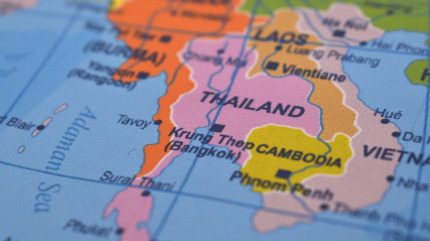
Thailand is set to reinitiate discussions with Cambodia over a lucrative offshore oil and gas field, reported Bloomberg.
Potentially worth $300bn (Bt10tn), the field has been at the centre of a long-standing territorial dispute between the two nations since the 1970s.
Thailand’s new administration, led by Prime Minister Paetongtarn Shinawatra, has prioritised the joint exploration of this field as a top urgent goal.
This move aims to bolster the nation’s depleting gas reserves and manage rising electricity costs and fuel import bills.
The 26,000km² area in question is believed to hold around 10tcf of natural gas and 300mbbl of crude oil.
As per the report, the path to an agreement is complex, marred by historical diplomatic tensions and concerns over sovereignty.
How well do you really know your competitors?
Access the most comprehensive Company Profiles on the market, powered by GlobalData. Save hours of research. Gain competitive edge.

Thank you!
Your download email will arrive shortly
Not ready to buy yet? Download a free sample
We are confident about the unique quality of our Company Profiles. However, we want you to make the most beneficial decision for your business, so we offer a free sample that you can download by submitting the below form
By GlobalDataSince 2001, negotiations have been at a standstill, with both nations insisting that territorial claims and resource development be addressed concurrently.
However, the pressing need to address Thailand’s declining gas production and the finite window for fossil fuel utilisation may drive a breakthrough, allowing exploration to commence while deferring the resolution of territorial disputes.
Last month, Thailand Finance Minister Pichai Chunhavajira told the parliament: “We do not need to resolve the different opinions on boundaries, we just need to have neighbourly chats and try to make use of the resources. That will boost security as well as cut utility costs.”
Cambodian Government spokesperson Pen Bona expressed readiness to resume talks, contingent on the willingness of Thailand’s new government.
“If the new Government of Thailand is ready, we are happy to continue the negotiations,” he stated.
Natural gas is pivotal for Thailand, satisfying 60% of its power requirements, with more than half sourced domestically.
At the current consumption rate, Thailand’s gas reserves could be exhausted within five to ten years.
The country also faces challenges in meeting its growing power demand, especially as it seeks to become a hub for energy-intensive industries such as data centres.
Both nations have previously proposed revenue-sharing models for the Overlapping Claims Area.
Former Thai Energy Minister Pichai Naripthaphan estimated the resources in this region to be worth at least $300bn.
Successful negotiations could benefit companies such as Chevron, Shell and PTT Exploration & Production, which secured concessions in the 1970s but have been unable to explore the disputed zone.
ConocoPhillips and TotalEnergies have also reportedly secured concessions in Cambodia.
Cambodia, heavily reliant on energy imports, may not feel the same urgency as Thailand, which has a more established oil and gas sector.
Thai officials have confirmed that negotiations with Cambodia are a priority for the prime minister, though no timeline has been provided.



